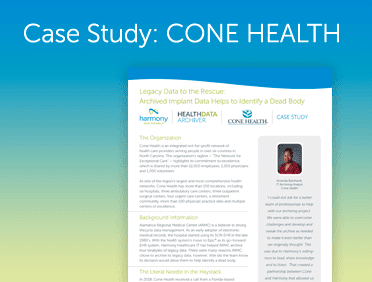
In 2018, Cone Health in North Carolina received a call from a Florida-based detective inquiring whether a fastener serial number from a hip implant would be enough information to identify a dead body. The detective knew, from the manufacturer, that the fastener shipped to the health system in 2009, but, that was all he had for clues.

Amanda Barnhardt, IT Archiving Analyst Cone Health
“I could not ask for a better team of professionals to help with our archiving project. We were able to overcome challenges and develop and tweak the archive as needed to make it even better than we originally thought. This was due to Harmony’s willingness to lead, share knowledge and to listen. That created a partnership between Cone and Harmony that allowed us to effectively archive a large amount of data in a small amount of time.”
With tens of millions of patient records before them, the Cone Health team went to work, querying its archived data. Within hours, they managed to both identify the patient and help solve the case.
Accessibility to legacy patient data is critical, but can be a challenge if it is stored in multiple disparate systems. Employing an archiving strategy not only reduces data silos and streamlines search, but also defends against a cyber attack by limiting the number of open doors and windows created by outdated technology.
There are many reasons to archive legacy data. And many benefits to doing so, including:
- Compliance with medical record retention requirements
- Risk reduction of losing data as technology and equipment ages
- Cost reduction from streamlining the number of operating systems
- Simplified access to data
There’s also a chance that a detective will call with an unusual request.
Archive for the win.
Read or download the full Cone Health Data Archiving Case Study.
Connect with us to protect your legacy data.






